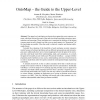Free Online Productivity Tools
i2Speak
i2Symbol
i2OCR
iTex2Img
iWeb2Print
iWeb2Shot
i2Type
iPdf2Split
iPdf2Merge
i2Bopomofo
i2Arabic
i2Style
i2Image
i2PDF
iLatex2Rtf
Sci2ools
119
click to vote
SEMWEB
2001
Springer
2001
Springer
OntoMap - the Guide to the Upper-Level
Abstract. The upper-level ontologies are theories that capture the most common concepts, which are relevant for many of the tasks involving knowledge extraction, representation, and reasoning. These ontologies use to represent the skeleton of the human common-sense in such a formal way that covers as much aspects (or ”dimensions”) of the knowledge as possible. Often the result is relatively complex and abstract philosophic theory. Currently the evaluation of the feasibility of such ontologies is pretty expensive mostly because of technical problems such as different representations and terminologies used. Additionally, there are no formal mappings between the upper-level ontologies that could make easier their understanding, study, and comparison. As a result, the upper-level models are not widely used. We present OntoMap — a project with the pragmatic goal to facilitate an easy access, understanding, and reuse of such resources in order to make them useful for experts outside th...
Abstract Philosophic Theory | Internet Technology | SEMWEB 2001 | Tasks Involving Knowledge | Upper-level Ontologies |
| Added | 30 Jul 2010 |
| Updated | 30 Jul 2010 |
| Type | Conference |
| Year | 2001 |
| Where | SEMWEB |
| Authors | Atanas K. Kirakov, Marin Dimitrov |
Comments (0)

